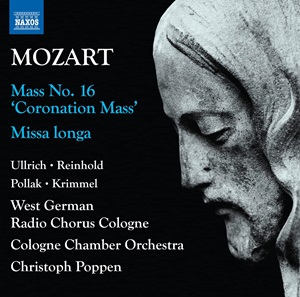
Wolfgang Amadeus Mozart (1756-1791)
Complete Masses Vol 1
Missa longa in C major, K. 262 (1775)
Mass in C major, K. 317 ‘Coronation’ (1779)
Carolina Ullrich (soprano)
Marie Henriette Reinhold (mezzo-soprano)
Angelo Pollak (tenor)
Konstantin Krimmel (bass)
West German Radio Chorus Cologne
Cologne Chamber Orchestra/Christoph Poppen
rec. 2020, Deutschlandfunk Kammermusiksaal, Cologne, Germany
Booklet with commentary in English and German, as well as sung texts with English and German translations included
Naxos 8.574270 [55:58]
After reviewing a period-instrument performance of Wolfgang Amadeus Mozart’s ‘Coronation’ Mass in C major, K. 317, on BR Klassik in February 2023, it is interesting to hear the same work on modern instruments and without additional pieces interpolated between movements. This is the most frequently recorded mass that Mozart wrote while in the service of Prince-Archbishop Hieronymus von Colloredo in Salzburg. This new entry features the conductor Christoph Poppen, the Cologne Chamber Orchestra, the West German Radio Chorus Cologne, and four young soloists.
Poppen employs musicians and singers in quantities that may resemble those at Mozart’s disposal, but the instruments and pitch are modern. These recordings prompt questions about the meaning of ‘authenticity’, which consists not only of historic instruments and pitch but also context. The use of period instruments in the proportions specified by composers within acoustics resembling those of venues for which works were conceived provides a sense of how music might have sounded. What is missing (and is impossible to recapture) is the context. Mozart wrote seventeen masses for performances within church services. The most complete ‘authenticity’ would involve playing these works in the churches for which they were originally intended (the exact dates of performance and the churches are not always clear, however) within a fully reconstructed liturgical service. To the best of my knowledge, no complete records of these exist. If we accept that these masses are the surviving musical aspects of religious services that cannot (and perhaps should not be) recreated, then we can enjoy Mozart’s compositions on our own terms. If we push ‘authenticity’ to its logical limit, then no performance outside a liturgical service would be possible. How Mozart and his contemporaries would have reacted to masses treated as concert music is the subject for a thought experiment with implications too far-reaching to be addressed here.
Composed in 1775, the ‘Missa longa’ in C major, K. 262, which opens the present disc, is scored for strings, oboes, trumpets, horns, timpani, and trombones. The scale and elaborate orchestration in comparison to the numerous ‘missa brevis’ settings that Mozart produced in Salzburg suggest that this mass was intended for a special occasion. The exact circumstances of its initial performance are subject to ongoing investigation. The ‘Coronation’ Mass in C major, K. 317, was probably first performed in Salzburg during Easter in 1779, but the sobriquet arose after it was used at the coronation of the Holy Roman Emperor, Franz II, in Prague in 1792.
Poppen has provided accounts of two masses in a format ideally suited to home listening (i.e., the musical movements of the mass are presented consecutively without any interpolations). I enjoy the aforementioned disc from BR Klassik, which featured a conjectural interspersion of small works between the individual movements. But I prefer to hear the mass sections uninterrupted because recordings have to be understood as distinct from the original liturgical function.
Poppen conducts both masses with energy, dynamic rhythm, and textual precision shorn of embellishments. He creates a type of ‘authenticity’ by focusing on the Latin texts, which the choir and soloists articulate with astonishing clarity. Tempi flow, and the West German Radio Chorus Cologne and the quartet of soloists blends into a homogeneous musical texture so that no individual performer stands out. The Cologne Chamber Orchestra, of which Poppen is chief conductor, plays with agility and commitment.
The sound is intimate and detailed with a feeling of real performances even though the recordings were made during multiple sessions. In the booklet, Naxos has provided libretti in Latin with translations into English and German, as well as a valuable introductory essay in English with a German translation.
This release augurs well for the prospective series of Mozart’s masses that will make the early works accessible outside boxed sets, which tend to reissue venerable recordings made between the 1970s and early 1990s. Poppen and his forces will, hopefully, maintain the high standard in evidence here for the duration of the cycle.
Daniel Floyd
Help us financially by purchasing from




















